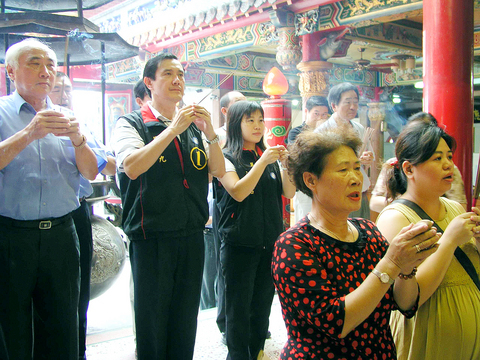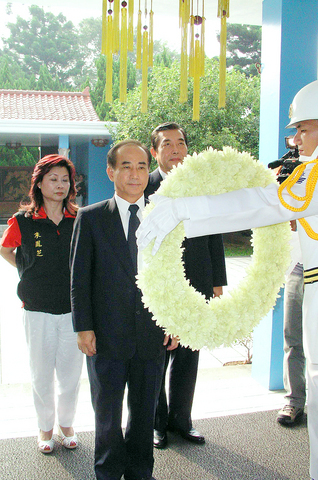Despite claims that he would not intervene in the election for Chinese Nationalist Party (KMT) chairman, People First Party Chairman James Soong (宋楚瑜) yesterday, on election eve, came down on the side of Legislative Speaker Wang Jin-pyng (王金平).
Wang last night broadcast a videotaped message to a campaign rally that sealed Soong's support for Wang over his rival, Taipei Mayor Ma Ying-jeou (
"[In the tape, Soong] did not bring up my election bid. However, his meaning is clear. He hopes that I will win," Wang said at the legislature earlier yesterday.

PHOTOS: HSU PAI-YING AND CHOU MIN-HUNG, TAIPEI TIMES
Before leaving the country for an extended vacation in the US, Soong presented Wang's campaign headquarters with the tape.
In a further hint of where PFP support lies, PFP policy research center director Chang Hsien-yao (張顯耀) urged voters to support Wang in Nantou on Thursday night, while a number of PFP legislators, including Deputy Legislative Speaker Chung Jung-chi (鍾榮吉), made appearances at Wang's rally last night in Taipei.
In response, Ma, campaigning in Pingtung County yesterday, said that he relied on ideals and not on personal connections.

"The reason why [other pan-blue camp members] left the KMT was mostly because of dissatisfaction with the KMT's past affiliation with `black gold' [corruption] and policy direction," Ma said.
"Most importantly, the KMT must find its original direction, to support the Republic of China, oppose Taiwanese independence and oppose the `one country, two systems' policy. If these things can be accomplished, then some members of the PFP and the New Party would consider returning to the KMT," Ma said.
Meanwhile, the KMT yesterday released the number of eligible voters and other details of today's vote.
"I don't dare hazard a guess at the turnout in this election. However, it should be higher than last time," said KMT organization and development committee head Liao Feng-teh (
The party said 928,175 members voted in the last chairmanship election four years ago.
In that election, for which outgoing Chairman Lien Chan (
But given that this was only the second time in the party's history that party members had been able to directly elect their leader and that the election was a run-off between two highly popular party leaders, it was reasonable to expect that the voting rate would be high, Liao said.
Already, Liao said, more than 10,200 ballots from overseas party members had been cast.
The ballots from the party's 59 overseas offices will be counted today along with the rest of the votes cast by the party's million-strong voting pool.
Voting will begin at 8am and end at 4pm at 601 polling stations across the nation. While voters will not be greeted by surveillance cameras at voting stations, as the Ma camp had requested to combat voter fraud, each polling station will be supervised by up to three volunteers from both the Wang and Ma camps, in addition to regular party personnel.
Apart from voting for their next leader, party members will also be voting for regional delegates. More than 1,356 candidates, including Lien's son, Lien Sheng-wen (
According to KMT rules, elections for regional delegates are held on the same day as the chairmanship election. Delegates serve four-year terms concurrently with the term of the chairman.

CHAOS: Iranians took to the streets playing celebratory music after reports of Khamenei’s death on Saturday, while mourners also gathered in Tehran yesterday Iranian Supreme Leader Ayatollah Ali Khamenei was killed in a major attack on Iran launched by Israel and the US, throwing the future of the Islamic republic into doubt and raising the risk of regional instability. Iranian state television and the state-run IRNA news agency announced the 86-year-old’s death early yesterday. US President Donald Trump said it gave Iranians their “greatest chance” to “take back” their country. The announcements came after a joint US and Israeli aerial bombardment that targeted Iranian military and governmental sites. Trump said the “heavy and pinpoint bombing” would continue through the week or as long

TRUST: The KMT said it respected the US’ timing and considerations, and hoped it would continue to honor its commitments to helping Taiwan bolster its defenses and deterrence US President Donald Trump is delaying a multibillion-dollar arms sale to Taiwan to ensure his visit to Beijing is successful, a New York Times report said. The weapons sales package has stalled in the US Department of State, the report said, citing US officials it did not identify. The White House has told agencies not to push forward ahead of Trump’s meeting with Chinese President Xi Jinping (習近平), it said. The two last month held a phone call to discuss trade and geopolitical flashpoints ahead of the summit. Xi raised the Taiwan issue and urged the US to handle arms sales to

State-run CPC Corp, Taiwan (CPC, 台灣中油) yesterday said that it had confirmed on Saturday night with its liquefied natural gas (LNG) and crude oil suppliers that shipments are proceeding as scheduled and that domestic supplies remain unaffected. The CPC yesterday announced the gasoline and diesel prices will rise by NT$0.2 and NT$0.4 per liter, respectively, starting Monday, citing Middle East tensions and blizzards in the eastern United States. CPC also iterated it has been reducing the proportion of crude oil imports from the Middle East and diversifying its supply sources in the past few years in response to geopolitical risks, expanding

OTHER OPTIONS: Given possible US intervention and Taiwanese counterattacks, China might opt to blockade Taiwan or take its outlying islands instead of an all-out invasion A US think tank has urged Taiwan to adopt a “hellscape” strategy that would flood the Taiwan Strait with drones and other uncrewed systems to deter invasion by China. In its report, Hellscape for Taiwan, published on Thursday, the Center for a New American Security said Taipei’s asymmetric defense approach — often described as a “porcupine strategy” — needs to evolve to keep pace with the growing capabilities of the Chinese People’s Liberation Army. The “hellscape” strategy involves saturating the air and waters around Taiwan with thousands of drones and other platforms capable of striking invading forces from multiple domains at once. Long-range